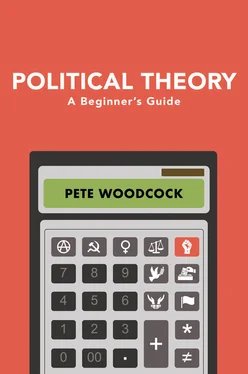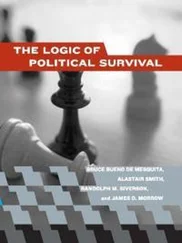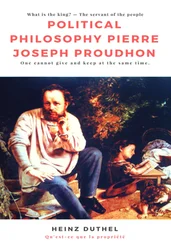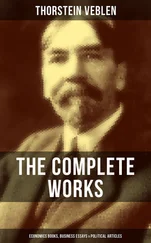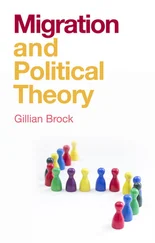1 Cover
2 Front Matter Political Theory A Beginner’s Guide Pete Woodcock polity
3 Chapter 1: Introduction 1 Introduction
Purpose of this book Why should we bother with the history of political thought? How to use this book Contents of this book Methodology Works cited Notes
4 Chapter 2: What is the nature of politics? Chapter overview Socrates and the examined life Machiavelli and glory Utilitarianism and happiness Kant, Walzer, morality and dirty hands Weber Conclusion Works cited
5 Chapter 3: Is humanity nasty or nice? Chapter overview Thomas Hobbes John Locke Jean-Jacques Rousseau Friedrich Nietzsche Conclusion Works cited
6 Chapter 4: Why should I obey the state? Chapter overview Hobbes and obedience John Locke’s critique Critics of social contract theory Rousseau and Patemen: obligation and participation Conclusion Works cited
7 Chapter 5: Is democracy the best form of government? Chapter overview Athenian beginnings Rousseau and Montesquieu The role of the representative: Edmund Burke Democracy in America The tyranny of the majority Conclusion Works cited
8 Chapter 6: When can my freedom be restricted? Chapter overview Thomas Hobbes and freedom Mill’s Harm Principle Conclusion Works cited
9 Chapter 7: What would a just society look like? Chapter overview Plato: justice as the harmonious state Aristotle: justice as happiness and the general good Locke: natural rights and property Hume Rawls: Justice as fairness Nozick Conclusion Works cited
10 Chapter 8: Why have women been ignored in the history of political thought? Chapter overview Women in the history of political thought Mary Wollstonecraft John Stuart Mill Iris Marion Young Conclusion Works cited
11 Chapter 9: When is revolution against government justified? Chapter overview Burke vs Paine Capitalism Karl Marx Conclusion Works cited
12 Chapter 10: Conclusion: Ideologies Introduction Liberalism Conservatism Socialism Applying the ideologies Conclusion Works cited
13 Index
14 End User License Agreement
1 Cover
2 Table of Contents
3 Begin Reading
1 ii
2 iii
3 iv
4 vi
5 1
6 2
7 3
8 4
9 5
10 6
11 7
12 8
13 9
14 10
15 11
16 12
17 13
18 14
19 15
20 16
21 17
22 18
23 19
24 20
25 21
26 22
27 23
28 24
29 25
30 26
31 27
32 28
33 29
34 30
35 31
36 32
37 33
38 34
39 35
40 36
41 37
42 38
43 39
44 40
45 41
46 42
47 43
48 44
49 45
50 46
51 47
52 48
53 49
54 50
55 51
56 52
57 53
58 54
59 55
60 56
61 57
62 58
63 59
64 60
65 61
66 62
67 63
68 64
69 65
70 66
71 67
72 68
73 69
74 70
75 71
76 72
77 73
78 74
79 75
80 76
81 77
82 78
83 79
84 80
85 81
86 82
87 83
88 84
89 85
90 86
91 87
92 88
93 89
94 90
95 91
96 92
97 93
98 94
99 95
100 96
101 97
102 98
103 99
104 100
105 101
106 102
107 103
108 104
109 105
110 106
111 107
112 108
113 109
114 110
115 111
116 112
117 113
118 114
119 115
120 116
121 117
122 118
123 119
124 120
125 121
126 122
127 123
128 124
129 125
130 126
131 127
132 128
133 129
134 130
135 131
136 132
137 133
138 134
139 135
140 136
141 137
142 138
143 139
144 140
145 141
146 142
147 143
148 144
149 145
150 146
151 147
152 148
153 149
154 150
155 151
156 152
157 153
158 154
159 155
160 156
161 157
162 158
163 159
164 160
165 161
166 162
167 163
168 164
169 165
170 166
171 167
172 168
173 169
174 170
175 171
176 172
177 173
178 174
179 175
180 176
181 177
182 178
183 179
184 180
185 181
186 182
187 183
188 184
To
Raphs and Issy
Political Theory
A Beginner’s Guide
Pete Woodcock
polity
Copyright © Pete Woodcock 2020
The right of Pete Woodcock to be identified as Author of this Work has been asserted in accordance with the UK Copyright, Designs and Patents Act 1988.
First published in 2020 by Polity Press
Polity Press
65 Bridge Street
Cambridge CB2 1UR, UK
Polity Press
101 Station Landing
Suite 300
Medford, MA 02155, USA
All rights reserved. Except for the quotation of short passages for the purpose of criticism and review, no part of this publication may be reproduced, stored in a retrieval system or transmitted, in any form or by any means, electronic, mechanical, photocopying, recording or otherwise, without the prior permission of the publisher.
ISBN-13: 978-1-5095-3136-3
A catalogue record for this book is available from the British Library.
Library of Congress Cataloging-in-Publication Data
Names: Woodcock, Pete (Peter Stewart), author.
Title: Political theory : a beginner’s guide / Pete Woodcock.
Description: Cambridge, UK ; Medford, MA : Polity, [2020] | Includes bibliographical references and index. | Summary: “In this highly accessible new introductory textbook, Pete Woodcock examines the fundamental questions of political theory. He takes students step-by-step through the most important answers given by history’s most famous thinkers to the most essential questions in politics, on topics ranging from liberty and justice to gender and revolution”-- Provided by publisher.
Identifiers: LCCN 2019024002 (print) | LCCN 2019024003 (ebook) | ISBN 9781509531332 (hardback) | ISBN 9781509531349 (paperback) | ISBN 9781509531363 (epub)
Subjects: LCSH: Political science--Philosophy.
Classification: LCC JA71 .W68 2020 (print) | LCC JA71 (ebook) | DDC 320.01--dc23
LC record available at https://lccn.loc.gov/2019024002LC ebook record available at https://lccn.loc.gov/2019024003
The publisher has used its best endeavours to ensure that the URLs for external websites referred to in this book are correct and active at the time of going to press. However, the publisher has no responsibility for the websites and can make no guarantee that a site will remain live or that the content is or will remain appropriate.
Every effort has been made to trace all copyright holders, but if any have been overlooked the publisher will be pleased to include any necessary credits in any subsequent reprint or edition.
For further information on Polity, visit our website: politybooks.com
This book is the result of teaching I have delivered at the University of Huddersfield, and prior to that at the University of Southampton; I am in the debt of colleagues and students at both institutions that have endured my endless wittering on the subjects contained within these pages. I appreciate how lucky I am to spend my working life discussing these things with you all.
Whilst writing this book I have sought refuge in the University of Huddersfield’s library, the Leeds Library, and Lindley Library (Kirklees), and have benefitted greatly from the expertise of the staff of those institutions, and the tranquillity of the surroundings.
Читать дальше
